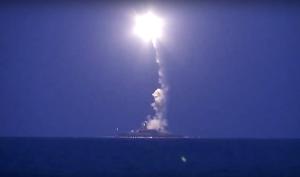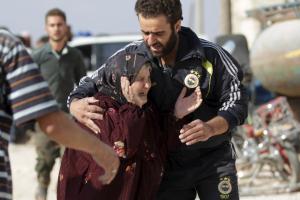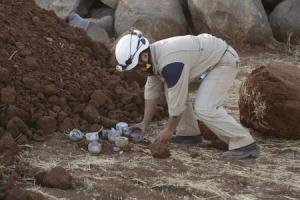BEIRUT (Reuters) - Syrian troops and allied militia backed by a fresh wave of Russian air strikes and cruise missiles fired from warships attacked rebel forces on Thursday as the government extended a major offensive to recapture territory in the west of the country.
Rebel advances in western Syria earlier this year had threatened the coastal region vital to President Bashar al-Assad's control of the area and prompted Russia's intervention on their ally's side last week.
In a further show of force, the Russian defense ministry said missiles fired from its ships in the Caspian Sea hit weapons factories, arms dumps, command centers and training camps supporting Islamic State forces.
The Russian defense ministry said its air force hit 27 Islamic State targets, including a number of training sites, overnight in the provinces of Homs, Hama and Raqqa, Interfax news agency reported.
Ground forces loyal to the Syrian government targeted insurgents in the Ghab Plain area in the west of the country, with heavy barrages of surface-to-surface missiles as Russian warplanes bombed from above, according to the British-based Syrian Observatory for Human Rights and a rebel fighting there.
View gallery

In this photo made from the footage taken from Russian Defense Ministry official web site, Wednesday …
It said rebels had shot down a helicopter in Hama province in western Syria. It was unclear if it was Syrian or Russian.
Syria said it had set in train a major military operation in a war that began more than four years ago as an attempt to unseat Assad through street protests and has now killed 250,000 people, sent millions into exile as refugees, and drawn in armed forces from world and regional powers.
Assad's armed forces "have launched wide-ranging attacks to deal with the terrorist groups, and to liberate the areas which had suffered from the terrorist rule and crimes," Syria's army Chief of Staff, Lt. Gen. Ali Abdullah Ayoub, was quoted as saying by state media.
NEW FIGHTING UNITS
Ayoub did not say which areas were being targeted. He said new fighting units, including one called the Fourth Assault Corps, had been set up to wage the campaign and the army now held the military initiative.
View gallery

A man comforts a woman whose relatives were killed, at a site hit by what activists were airstrikes …
The Observatory's head, Rami Abdulrahman, said an assault launched by the army and its foreign allies on Wednesday in nearby areas of Hama province had so far failed to make significant gains, however.
"At least 13 regime forces were killed ... The clashes also killed 11 (rebel) fighters," he said in a statement, and the numbers were expected to rise as more casualties were confirmed.
Around 15 army tanks and armored vehicles had been destroyed or immobilized by rebel missile strikes, Abdulrahman and an opposition activist on the ground said.
Wednesday's operation in Hama appeared to be the first major assault coordinated between Syrian troops and militia on the ground, and Russian warplanes and naval ships.
The Ghab Plain, also in Hama, lies next to a mountain range that forms the heartland of Assad's Alawite sect.
View gallery

A civil defence member gathers unexploded cluster bomblets that activists say were fired by the Russ …
Recapturing it from the alliance of rebel groups, including al Qaeda's Nusra Front which thrust into the area in late July, would help secure Assad's coastal heartlands and could provide a platform to drive the rebels back from other areas.
A fighter from the Ajnad al-Sham insurgent group who uses the name Abu al-Baraa al-Hamawi told Reuters that Russian jets had been bombing since dawn. It was not the first time the Russians had bombed the area, but this was their most ferocious attack, he said, speaking via an Internet messaging service.
"There is an attempt by the regime to advance but the situation is under our control," he said.
"God willing we will repeat the massacre of the north Hama countryside as happened yesterday," Hamawi added, referring to the strikes on the tanks. "We have faced more violent attacks than this in the past."
ANGER OVER AIR SPACE
Russian air strikes started last week and have mostly focused in areas of western Syria where Assad has sought to shore up his control after losing swathes of the rest of the country to insurgents including the Islamic State group.
Russia says it is fighting Islamic State in Syria. But while the group has been the target of some of its air strikes, it has no foothold in the areas of western Syria targeted in the attacks on Wednesday and Thursday.
For about a year before Russia joined the fighting, a U.S.-led coalition has been mounting air strikes of its own intended to defeat Islamic State in Iraq and Syria. On Wednesday the coalition launched 18 strikes against Islamic State in Iraq and two in Syria, a statement said.
Neighboring Turkey has been angered by violations of its air space by Russian warplanes and NATO said it was prepared to send troops to Turkey to defend its ally.
"NATO is ready and able to defend all allies, including Turkey against any threats," NATO Secretary-General Jens toltenberg told reporters as he arrived for a meeting in Brussels of the alliance's defense ministers which is likely to be dominated by the war in Syria.
At the meeting, Turkey appealed to its NATO allies to shore up missile defenses aimed at shooting down Syrian rockets, after Germany said again that it would withdraw its Patriot batteries and the United States was set to do the same. NATO is now waiting for other nations to plug those gaps.
(Writing by Giles Elgood, editing by Sonya Hepinstall and Peter Millership)